I was thrown back into Africa with a bang. This time I did not arrive by the gradually changing land path but flew straight into Congo and got hit by the full force of cultural contrast. It started already at the Ethiopian check-in desk at Arlanda airport in Stockholm. In the queue in front of me were two black girls in their twenties carrying a mountain of luggage. As they were flying to Addis Ababa they had probably Ethiopian heritage. Without hesitation I was asked, in good Swedish, if I could check in one of their bags as I only had one piece of luggage and the allowance was two. They indicated that the overweight would cost them extra money. Quite naturally, I turned down their request. I wouldn’t carry the luggage of a stranger over any border. The idea of ending up in an Ethiopian prison for bringing illegal substances into the country does not appeal to me. It doesn’t matter how innocent the girls’ request was, I just wouldn’t take the risk and besides, if you can afford all that luggage you should be able to afford the overweight charges.
When I landed in Pointe-Noire on the coast of Congo I took a taxi to my pre-booked hotel. Not that the booking had any relevance as they lacked any form of electronic system to back it up. The taxi driver tried to overcharge me – of course. There is nothing else to expect, especially when picked up at the airport. I managed to keep the charges to a reasonable level but as I checked into the hotel, which cost a hefty 36 000 CFA (60 €) the taxi driver started to talk to the hotel clerk. They spoke in French so I did not understand anything of what they were saying. I paid 40 000 CFA. The hotel didn’t have any change which is no strange thing in underdeveloped countries but I understood that I would get them the next morning. This happens all the time.
When I checked out the next morning and asked for my 4 000 CFA the girl behind the counter looked at me with authentic surprise and said that she had given them to the taxi man. When they spoke in French the previous day, the taxi man had apparently fooled the girl into thinking that I had not paid him, as I supposedly didn’t have any change so she had given him my 4 000 CFA change. Guess who had to pay for her mistake? They always get you in the end, don’t they?
Every time I describe a lodging with words like; hotel, check-in desk, hotel clerk, lobby, etcetera, I feel like I’m painting a picture of western style luxury. After all Residence Saint-Jacques had both swimming pool, a restaurant, air conditioned rooms with TV and hot water but don’t be fooled people, don’t be fooled. The small swimming pool was only half full and the water was green and murky, the check-in desk was just a simple counter made of cheap wood, the restaurant looked like it had not been open in many years and every detail about the hotel was as mismanaged and uncared for as every other establishment in Africa.
For 60 € I could get a small but perfectly clean, nice and comfy room in central Stockholm if I searched a little. In big African cities, only because you add air conditioning to a room, they feel entitled to double or triple the price. That the toilet doesn’t flush has no relevance, that the swimming pool is unusable doesn’t matter and nobody would ever think about fixing that broken bulb, or the door that doesn’t close properly, or making the slightest effort to make a room only a little attractive. Most big city hotels in Africa are extremely poor value for money.
On the third day after entering Africa I set out from the city of Dolisie, 190 kilometers inland from Pointe-Noire, to retrieve my motorcycle at the border with Gabon where I had left it in a hurry six months ago. Then, at the end of May, I had entered Congo at the small village of Ngongo. I had just got my passport stamped and was leaving the village when the accident occurred. I was helped by some local people to get the bike and myself back to the police hut where I quickly arranged my luggage, locked the bike and left it in the hands of the police officer.
On the back of a small motorcycle I was transported along a very bad stretch of road to Nyanga, the nearest village with a road decent enough for car traffic. The motorcycle driver and I passed numerous mud pools and deep ruts covered with water. It is 47 kilometers between Ngongo and Nyanga and this short stretch of road has been on my mind during my entire convalescence. When I was sitting immobilized on my parents’ veranda in the midst of the Swedish summer, it was these 47 kilometers that kept nagging me as a vague annoyance somewhere inside my head. How I was supposed to navigate these obstacles with a freshly operated knee I did not know but here I was on my way there.
From Dolisie I took a communal taxi, a car filled to capacity with locals going to their home villages. When asked where I was going I told the driver that my destination was Ngongo and we agreed on the fare. The fare was presumably for the whole way to Ngongo but I expected to be dropped off in Nyanga as the dilapidated taxi would not be able to go any further. This is the excitement with not understanding the local language; the details are many times sketchy.
The 240 kilometers to Nyanga took six hours and this part of the road was actually in a bit worse condition than I remembered it to be. We passed a few sections with small water holes and a bit of mud. Especially one stretch where they were improving the road it looked a little worrisome but compared to what was waiting on the far side of Nyanga, this was of less concern.
As we entered Nyanga I more or less expected that this would be the end point of this taxi trip but one of the ladies in the back seat remained in the car as we came to a stop outside a small shop. Would we continue after all? And what did that say about the road condition? This two-wheel drive Toyota on the verge of collapse would not be able to continue any further if the road had not been improved. My hopes rose a little but I didn’t allow myself to get carried away. Not yet.
The first few kilometers out of Nyanga had been good last time as well but I looked at every corner in the road, expecting some sort of obstacle. Kilometer was laid to kilometer with no mud in sight and when we had covered half the distance to Ngongo I started to realize that they really had improved this stretch of road and when the driver had indicated that he was going to Ngongo, he had really meant it. I let my hopes lose and enjoyed travelling on what turned out to be the best piece of road between Dolisie and Ngongo. How wonderful! The nagging feeling in my head had been there for nothing. All of a sudden my prospects looked good.
As a result of the improvement of the road I did not recognize myself. Where there had been a narrow bush road impassable by normal cars, there was now a wide and flat gravel highway with freshly cut ditches on both sides, perfectly dry and perfectly flat. I started to get excited as we closed in on Ngongo. We passed the section of my accident but I only recognized it by the first houses of the village. We passed a left hand bend in the road and in the distance I could see the bar across the road which marks the immigration building. Across the road from it was the police hut where my bike should be. I kept looking after it eager to see with my own eyes that it really was there.
And it was. Behind a brick building, a familiar shape came into view. A silver colored bike cover with two wheels visible underneath. It was sitting there, resting on the main stand at the exact spot where I had left it. My friend, my buddy, my travel companion that had taken me all the way from Sweden to here stood there faithfully waiting for me. I jumped out of the taxi and got over to the bike, greeting it with a big smile as I petted it on the side of the tank.
Hi there buddy. How have you been all this time?
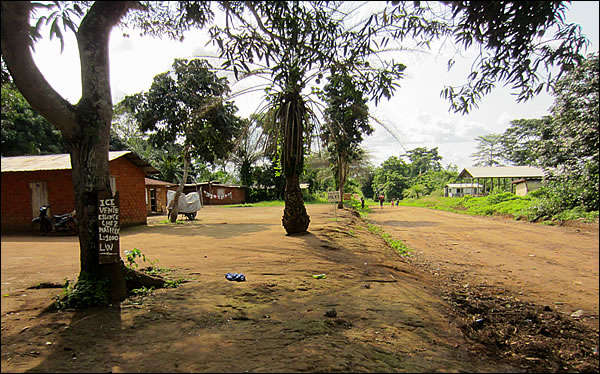
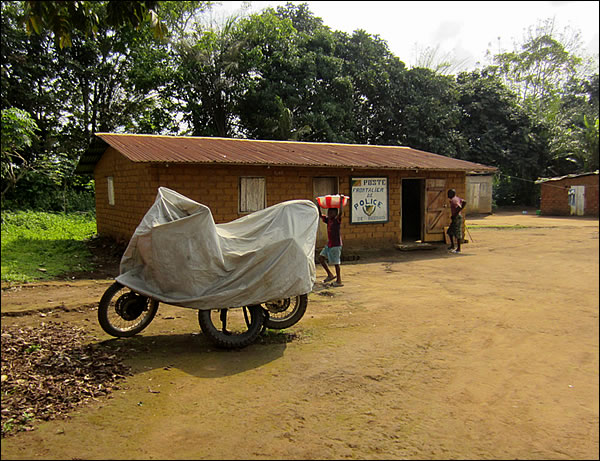
It was dusty and dirty, even underneath the silver fly. A few large spiders had built nests and died. One was still alive and got a free ride to Brazzaville which I discovered later. There was a bit of surface rust here and there but nothing out of the ordinary. The front tyre was flat but it had leaked air a tad bit during the last couple of months of my journey so it was no surprise. Other than that, the bike looked just fine. The question now was if there would be any juice left in the battery.
Last time I brought it out of winter storage in Sweden, the lights on the dashboard had lit up when I turned on the ignition and the starter motor went around once and then the battery had died. Prior to the trip I replaced the battery with a new one of a reliable brand but I really had no hopes at all that there would be any power left in it after sitting unused for six months. Ngongo was not connected to the national power grid so there was only power in the evenings produced by a generator. I could charge the battery but it would mean that I had to spend the night in the village and there was no lodging around. I’m sure I would have been given shelter by someone but I was also eager to get going while the road was still dry.
I put the key in the ignition and turned it one click. The lights came on. I turned the key one click more and the starter engine sprung into life. I waited for it to die but it kept turning. Five seconds, ten seconds, fifteen. I switched it off, waited a bit and tried again, this time with a little choke. The starter motor kept doing its job, fed by the power from the battery. I tried to coax the engine into life by carefully turning the throttle and then… The engine started.
Amazing! After six months sitting idle in the jungle the bike started within thirty seconds. There was blue smoke for a minute but after that the engine ran as smoothly as ever. When will I ever stop doubting my trusted friend?
I kept it running for a good fifteen minutes to give the battery a chance to recover. Meanwhile I pumped up the front tyre with the help of my mini compressor. The rear tyre still had 2 bars of pressure and I just had to top it up slightly.
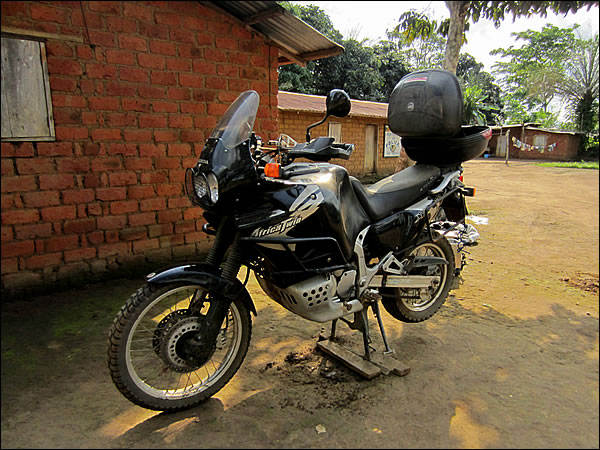
Many of the villagers came by to greet me and see the now familiar motorcycle be driven away. I met the old man that lived in the last house at the end of the village and that had come to my help right after the accident. His name was Tsemba and I showed him my unaltered gratitude by hand gestures and hand shakes. I also gave him a bit of money as hard cash is the most appreciated gift for poor people living off the land. I made sure he understood that it was a true sign of my appreciation for the help he had given me. He did not speak any English but I understood that it was his son that had driven me to Nyanga on his scooter that faithful day.
I also met the police officer who had cared for my bike and my belongings during my absence. He had kept a few lose pieces of luggage in his house while the majority was locked inside the motorcycle panniers. There was not a single thing missing. He also got a monetary reward that was promised him through a phone call from Sweden made by a French speaking colleague of mine. He was happy, I was happy, everyone was happy.
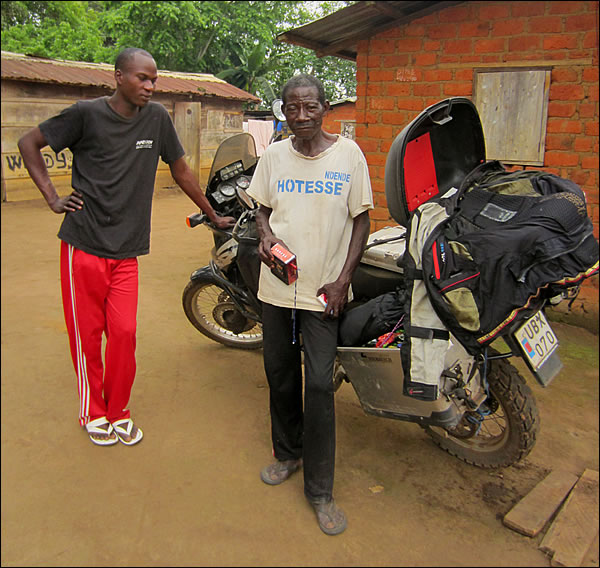
Mr. Tsemba in white T-shirt.
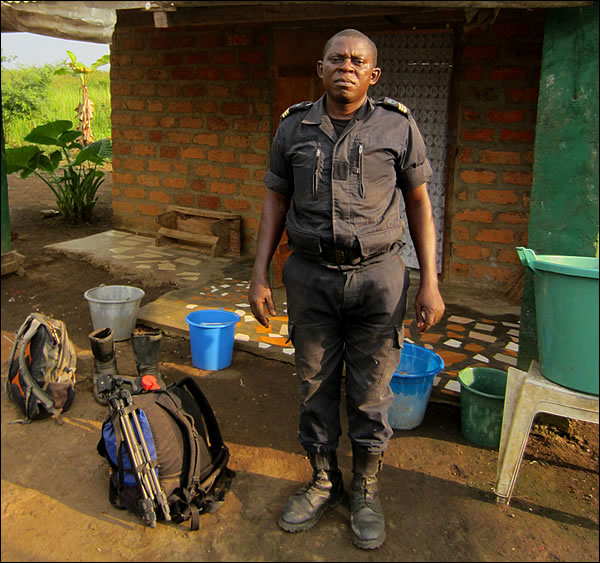
Police officer Caza outside his house where he kept part of my luggage

Ngongo village
My luggage was in much better shape than I had hoped for. I had expected mildew all over the place, especially in regards to my helmet and my riding clothes that I had stuffed into the top box still moist from a hot riding day. The clothes had a strong smell about them and the helmet had signs of mildew inside but I brushed it off, aired the clothes and suited up. The smell inside the helmet was too strong to have the visor closed but a few hours of driving aired most of the smell out. I later washed both the helmet and the clothes, as well as the bike and the equipment. Everyone greeted me as I rode through the village on my way to Dolisie. For the last time I passed the spot where the accident had taken place. That meant that my journey continued once again.

Site of the accident - May 2015
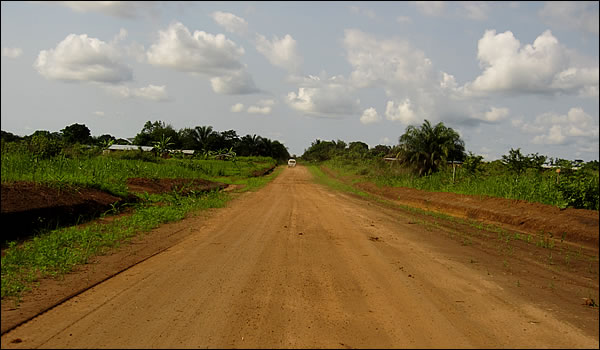
Site of the accident - November 2015
As the road to Nyanga was now in excellent condition my concern was redirected to the few dodgy places closer to Dolisie. I tiptoed past a few wet patches with a little mud, extremely careful not to get out of balance. I drove through some water holes but they were shallow and undramatic. I had memorized the best lines when I arrived in the taxi. The worst part was where they were improving the road. Over a distance of a few kilometers the road surface had been smoothed out which had resulted in a thin layer of semi-wet clay. There were wheel tracks of compacted surface that I could follow but I could not afford to lose the track. Very, very slowly did I manage this obstacle with my nerves on high alert and once out on the other side there were only a couple of minor obstacles left.
Fortunately, it had not rained during the last two days. If it would start to rain this trip would have been a totally different nut to crack. As I reached the paved road at the entrance to Dolisie I drew a deep sigh of relief. Just on the other side of town I could see heavy rain falling over the hills. But I was now on solid ground and it could rain as much as it wanted. I had managed to retrieve my motorcycle from the jungle and had been very fortunate with both road condition and weather.
But worse things were to come. Much, much worse.
/AB
|












